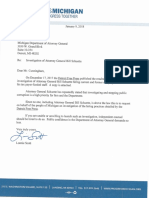Professional Documents
Culture Documents
Progress Michigan Motion To Expedite FOIA Lawsuit
Uploaded by
progressmichigan0 ratings0% found this document useful (0 votes)
163 views36 pagesProgress Michigan filed a motion to expedite their Freedom of Information Act lawsuit against Attorney General Bill Schuette. The watchdog group pointed to their recent complaints at the state and federal level as reasons for the court to expedite the lawsuit, which seeks private emails sent by Schuette and his staff to conduct state business. The motion was filed on January 5th.
Original Title
Progress Michigan Motion to Expedite FOIA Lawsuit
Copyright
© © All Rights Reserved
Available Formats
PDF or read online from Scribd
Share this document
Did you find this document useful?
Is this content inappropriate?
Report this DocumentProgress Michigan filed a motion to expedite their Freedom of Information Act lawsuit against Attorney General Bill Schuette. The watchdog group pointed to their recent complaints at the state and federal level as reasons for the court to expedite the lawsuit, which seeks private emails sent by Schuette and his staff to conduct state business. The motion was filed on January 5th.
Copyright:
© All Rights Reserved
Available Formats
Download as PDF or read online from Scribd
0 ratings0% found this document useful (0 votes)
163 views36 pagesProgress Michigan Motion To Expedite FOIA Lawsuit
Uploaded by
progressmichiganProgress Michigan filed a motion to expedite their Freedom of Information Act lawsuit against Attorney General Bill Schuette. The watchdog group pointed to their recent complaints at the state and federal level as reasons for the court to expedite the lawsuit, which seeks private emails sent by Schuette and his staff to conduct state business. The motion was filed on January 5th.
Copyright:
© All Rights Reserved
Available Formats
Download as PDF or read online from Scribd
You are on page 1of 36
STATE OF MICHIGAN
IN THE COURT OF APPEALS
PROGRESS MICHIGAN
Plaintiff-Appellee,
v.
ATTORNEY GENERAL BILL
SCHUETTE, in his official capacity
Defendant-Appellant,
PROGRESS MICHIGAN,
Plaintiff-Appellee,
y.
ATTORNEY GENERAL BILL
SCHUETTE, in his official capacity
Defendant-Appellant,
J
Court of Appeals No. 340921
Court of Claims No, 17-000093-MZ
Court of Appeals No. 340956
Court of Claims No. 17-000093-MZ.
MOTION OF PROGRESS MICHIGAN TO EXPEDITE CONSOLIDATED APPEALS
Goodman Acker, P.C.
‘Mark Brewer (P3561)
Attorneys for Plaintiff-Appellee
17000 W. Ten Mile Rd, 2" Floor
Southfield, MI 48075
(248) 483-5000
Christina Grossi (P67482)
Kyla L. Barranco (P81082)
Assistant Attomeys General
Attomeys for Defendant-Appellant
State Operations Division
P.O. Box 30754
Lansing, MI 48909
(517) 373-1162
NOW COMES Plaintiff-Appellee Progress Michigan, by and through its attomeys,
Goodman Acker, and moves to expedite these consolidated appeals for the following reasons and
grounds:
1, This lawsuit was brought by Progress Michigan in the Court of Claims under the
Freedom of Information Act (FOIA), MCL 15.231 et seq., to compel Schuette to
disclose emails from his and his staff's personal email accounts which were used to
conduct official functions,
2, The Court of Claims denied Schuette’s motion to dismiss the FOIA claim in Progress
Michigan’s First Amended Complaint, See Exhibit 1. These now-consolidated
appeals followed. See Exhibit 2 (order consolidating appeals).
3. FOIA requires that:
‘An action commenced under this section and an appeal commenced under this
section shall be assigned for hearing and trial or for argument at the earliest
wacticable date and expedited in every wa}
MCL 15,240(5) (emphasis added).
4, Progress Michigan has filed complaints under the Michigan Campaign Finance Act
and federal Hatch Act over Schuette’s illegal use of his staff to campaign for political
office. See Exhibits 3 and 4. The wrongfully concealed emails at issue in this case
may contain evidence relevant to the investigation of those complaints, necessitating
the disclosure of those emails as soon as possible.
WHEREFORE, Progress Michigan prays that the Court:
1. Grant this motion;
2. Order expedited briefing of these consolidated appeals with Schuette’s opening brief
due January 25, 2018;
3, Order expedited hearing of these consolidated appeals; and
4, Order an expedited decision in these consolidated appeals,
January 4, 2018
Respectfully submitted,
GOODMAN ACKER, P.C.
Js! Mark Brewer
Mark Brewer
Attorneys for Plaintiff-Appellee
17000 W. Ten Mile Rd, 2™ Floor
Southfield, MI 48075
(248) 483-5000
EXHIBIT 1
STATE OF MICHIGAN
COURT OF CLAIMS:
PROGRESS MICHIGAN,
OPINION AND ORDER,
Plaintiff,
v Case No. 17-000093-MZ,
BILL SCHUETTE, Hon. Cynthia Diane Stephens
Defendant.
Pending before the Court is defendant’s motion for summary disposition pursuant to
MCR 2.116(C)(4), (C)(8), and (C7). Because plaintiff complied with MCL 600.6431(1) and
the applicable period of limitations, the motion is DENIED in part. However, because there is
no private right of action to enforee purported violations of the Management and Budget Act
alleged by plaintiff, defendant’s motion is GRANTED in part and Count {1 of the Complaint is
DISMISSED with prejudice,
L PERTINENT FACTS AND BACKGROUND
‘On or about September 27, 2016, plaintiff sent a Freecom of Information Act (OLA),
MCL 15.231 et seq., request to defendant, seeking e-mails purportedly sent or received from
personal e-mail accounts by a group of 21 individuals who work for the Department of the
Attorney General. The Department denied the request on or about October 19, 2016, claiming
that, with one exception for which the Department cited a FOIA exemption, it did not possess
any records matching plaintif?s description, Plaintiff appealed the decision with the Department
pursuant to MCL 15.240(1)(a), and the Department denied the appeal on November 26, 2016.
Plaintiff filed a two-count complaint in this Court on April 11, 2017. Count I alleged that
defendant violated FOIA by “refus[ing] to disclose emails sent and received by defendant and his
staff using personal email accounts in the course of performing official fimotions ...* Count Il
was labeled “Pailure to Preserve State Records” and alleged that if the records existed and if the
Department destroyed the records, defendant violated the Management and Budget Act, Plaintiff
neither signed nor verified the complaint, contrary to MCL 600.6431(1).
Defendant moved to dismiss based on plaintiff's failure to comply with MCL
600.6431 (1). Altematively, defendant argued that the Court should dismiss Count 1 because
there was no private right of action for the purported violation of the Management and Budget
Act.
Shortly thereafter, plaintiff filed an amended complaint that contained neatly identical
allegations as those raised in its original complaint. This time, the amended complaint was
signed and verified before an officer authorized to administer oaths, as is required under §
6431(1). Plaintiff also responded to the motion to dismiss, arguing: (1) that it was not required
to comply with § 6431(1) when filing a FOIA action; (2) that its amended complaint was
Sufficient to satisfy the statute; and (3) that it could seek declaratory relief for a violation of the
Management and Budget Act
‘This matter is now before the Court on defendant's motion for summery disposition filed
in lieu of an answer to the first amended complaint,
I COMPLIANCE WITH MCL 600.6431(1)
Again, there is no dispute that plaintif’s original complaint was neither signed nor
verified. Nor is there any dispute that plaintiff's amended complaint was filed within the
relevant one-year time period established in § 6431(1), Rather, the first issue this case is whether
plaintiff, by amending its complaint to add previously omitted notice and verification
requiremetts, can demonstrate strict compliance with § 6431(1).
Section 6431(1) sets forth mandatory notice provisions for filing claims against the state
and provides that:
No claim may be maintained against the state unless the claimant, within 1 year
after such claim has accrued, files in the office of the clerk of the court of claims
cither a written claim or a waitten notice of intention to file a claim against the
state or any of its departments, commissions, boards, institutions, arms or
agencies, stating the time when and the place where such claim arose and in detail
the nature of the same and of the items of damage alleged or claimed to have been
sustained, which claim or notice shall be signed and verified by the claimant
before an officer authorized to administer oaths. [MCL 600.6431(1),]
Compliance with the notice provisions contained in MCL 600.6431 is a mandatory
condition precedent to pursuing a claim against the state. Fairley v Dep’t of Corrections, 497
Mich 290, 292; 871 NW2d 129 (2015); McCahan v Brennan, 492 Mich 730, 732-733; 822
NW2d 747 (2012). ‘The statute demands strict compliance, anything short of which requires
dismissal, Fairley, 497 Mich at 292-293. See also MeCahan, 492 Mich at 732-733, This state's
appellate courts have confirmed that the statute applies to all types of claims, regardless of the
nature of the underlying claim, See, e.g, Ruska v Dep't of Corrections, 307 Mich App 300, 307-
308; 859 NW2d 735 (2014),
In McCahan, 492 Mich at 738, the Court held that § 6431's prohibition on maintaining an
faction in the Court of Claims was implicated “as a consequence of a failure to file compliant
notice within” the statutory time period, (Emphasis added). ‘The Com reiterated the iden that a
compliant notice or claim had to be filed within the specified time period, but did not go so far as
to declare that a plaintiff only had a single opportunity to file a compliant claim or notice, Sec
id, at 742 (Therefore, the failure to file a compliant claim or notice of intent to file a claim
against the state within the relevant time periods designated in either subsection (1) or (3) will
trigger the statute’s prohibition that ‘[nJo claim may be maintained against the state... .” ”).
Indeed, it was the failure to file a compliant notice or claim within the statutory time period that
‘was pertinent o invoking the so-celled “bar-to-claim” language found in the statute, Consistent
with this approach, the Court of Appeals in Rusha, 307 Mich App at 306, explained that MCL
600.6431 unambiguously sets forth a “window within which to file a claim or notice of intent to
file a claim after an alleged” injury.
In light of the above, the Court rejects defendant’s assertion that a plaintiff has only one
opportunity within the relevant time period in which to comply with the statute's notice and
verification requirements. ‘The bar-io-claim language in § 6431 is triggered by the failure to file
compliant notice or claim within the statutory time period, and that an amended complaint, if
timely filed and otherwise compliant, does not trigger the prohibition on maintaining a claim
against the state, Turning to the instant case, plaintiff's initial complaint plainly failed to satisfy
§ 6431(1) because it was neither signed nor verified, However, plaintiff filed a signed and
nt di
verified compl 18 the 1-year period for doing so, Accordingly, unlike the plaintiffs in
cases such as MeCahan, Fairley, and Ruska, plaintiff filed a compliant claim “within 1 year after
such claim has acerued ...” as is required by MCL 600.6431(1). ‘The plain language of the
statute does not, as defendant contends, contain language that would limit a plaintiff to only one
opportunity to satisfy the statute's requirements. Rather, as noted, the only limit imposed is a
temporal one, and plaintiff has met that requirement in this case, In short, plaintiff has met the
requirement of strict compliance” with the one-year notice and verification requirements.
Despite defendant’s contentions that plaintiff should not be permitted to file an amended
complaint to comply with the verification requirements, the Court sees no reason that the
“window” described in Rusha, 307 Mich App at 306, does not remain open for the entirety of the
statutory period.' Indeed, the purpose of the statute is to give timely notice to the proper
governmental entity, see Fairley, 497 Mich at 298-299, and defendant in this case received
timely notice, Thus, the same concems in Fairley, MeCahan, and Rusha are not present in this
case.
In so concluding, the Court rejects defendant's assertion that § 6431(1)'s use of the word
“claim” is not synonymous with the term “complaint.” Defendant notes that § 6431(1) can be
setisfied by either a “written claim” or a “written notice of intention” (NOI) to file a claim.
According to defendant, a “claim” cannot be amended; only a “pleading,” such as a “complaint,”
can be amended. Sce MCR 2,118(A), Defendant essentially argues that a plaintiff can file a
complaint and therein assert a “claim” that can satisfy § 6431(1), but the “claim” as that term is
used in § 6431(1) is separate and distinct from a “complaint,” and only the latter may be
amended.
Adopting defendant’s position would require the Court to accept that a “claim” is not a
“pleading” as-that term is used in MCR 2,110(A), yet it can nevertheless commence a cause of
action. In essence, accepting defendant’s position would require this Court to conclude that a
' The Court notes that the Court of Appeals recently sanctioned a similar approach, See Council
of Organizations & Others for Edy State,__Mich App _,__n2;__ NW2d _ (2017); slip op
at 512. In that case, the Court granted jinmediate consideration oF an application for leave to
appeal, and simultaneously allowed the plaintiffs “to make a filing(s) in the Court of Claims in
accordance with the verification requirements of MCL. 600.6431.” Id. (citation and quotation
marks omitted).
es
“claim” is a “pleading” for purpose of coniinencing a cause of action, but it is not a “pleading”
for purposes of amendment under MCR 2.118(A). This cannot be squared with MCR 2.101(B),
which specifies that “[a] civil action is commenced by filing @ complaint with a court.”
(Emphasis added). Alternatively, adopting defendant's position would require the Court to
conclude that « claim can be asserted in a complaint, and that the complaint can be amended,
under MCR 2.118(A), but the “claim” asserted therein cannot be amended. Such a position does
not find support in the plain language of MCR 2.118(A), which does not limit amendments that
can be made in the manner suggested by defendant. The Court declines to read into MCR
2.118(A) the prohibition to amendment sought by defendant. Moreover, casclaw construing §
6431(1) has interpreted the term “claim” interchangeably with the term “complaint.” See, e.,
Rusha, 307 Mich App at 312, In sum, the Court sees no prohibition to amending a “claim? as the
term is used in § 6431(1), so long as the amendment is timely under the act.
‘The Court also finds unconvincing defendant’s apparent concems about unequal
‘treatment amongst claim filers and NOI filers. Defendant contends in cursory fashion that a NOT
cannot be amended once it is filed, and if the Court allows a claim to be amended, “it would be
providing an additional right not available to a claimant who files” a NOI. Defendant i
nores,
however, that there is no prohibition against filing multiple NOIs, Indeed, a NOI docs not
commence an action, and the Court can conceive of no reason why @ NOI could not be amended,
or re-filed, multiple times, so long as the temporal requirements of § 6431(1) are satisfied,
‘THE LIMITATIONS PERIOD DOES NOT BAR THE FOIA CLAIM.
‘As an altemative, defendant argues that, even assuming plaintiff could amend its
complaint, the FOIA claim must be dismissed because is untimely under the period of limitations
applicable to FOIA actions. ‘The FOIA sets forth a 180-day period for commencing an action to
compel disclosure of public records. MCL 15.240(1)(b); Prins v Mich State Police, 291 Mich
‘App 586, 587-588; 805 NW2d 619 (2011). The 180-day limitations period set forth in MCL
15.240(1)(b) begins to run when the public body sends out or circulates the denial of the request.
Prins, 291 Mich App at 591, Here, there is no dispute that plaintiff's original complaint was
filed within the 180-day period. There also does not appear to be any dispute that the amended
complaint was filed outside the limitations period? ‘The issue before the Court is whether the
original complaint tolled the limitations petiod and whether the amended complaint relates back
to the original, timely complaint. ‘The Court finds that it does and that the 180-day limitations
period does not require dismissal.
MCL 600.5856(a) provides that the statute of limitations is tolled “at the time the
complaint is filed, if a copy of the summons and complaint are served on the defendant within
the time set forth in the supreme court rules.” MCL 600.5856(2). Moreover, “t]he filing of the
original complaint will toll the running of the period of limitations pertaining to the claims
reflected in the amended complaint. .. if it is found that the amended pleading relates back to
the conduct, transaction, or occurrence set forth in the original pleading[.]” Sanders v Perfecting
Church, 303 Mich App 1, 9; 840 NW2d 401 (2013) (citations omitted). Stated differently, “an
amendment relates back to the date of the original pleading if the claim or defense asserted in the
amended pleading arose out of the conduct, transaction, or occurrence set forth, or attempted to
? To this end, the Court notes that plaintiff has not contested defendant’s arguments concerning
the proper date to use for determining on which day the period of limitations began to run.
Given the lack of argument on this issue, and given the Court's agreement with plaintiff that the
relation-back doctrine applies, see infra, the Court finds it unnecessary to address defendant's
claim that the 180-day period began fo run when the Department first denied the FOIA request,
and not when it denied plaintis?'s appeal,
be set forth, in the original pleading.” Doyle v Hutzel Hosp, 241 Mich App 206, 212; 615 NW2é
759 (2000) (citation and quotation marks omitted). As articulated in Doyle:
‘The chief importance of the relation-back rule is to determine whether or not the
statute of limitations has been satisfied. In broad terms, if the original complaint
was timely, it satisfied the statute of limitations even if it was defective and even
if the amendment that cured the defect was not made until after the running of the
statute. [/d. at 212 n 2, quoting Dean & Longhofer, 1 Michigan Court Rules
Practice (4th ed), § 2118.11, p. 561,]
Here, the amended complaint asserts a claim arising out of the same conduct, transaction,
or occurrence set forth in the original complaint. Accordingly, the amended complaint “relates
back” to the original complaint. See Sanders, 303 Mich App at 9; Doyle, 241 Mich App at 212.
‘And because the original complaint was timely, the amended complaint is timely as well.’ To
this end, the Court finds a case on which defendant relies, Miller v Chapman Contracting, 477
Mich 102, 107
77 NW2d 462 (2007), to be distinguishable and not dispositive in this case. At
issue in Miller was an amendment that sought to add a new party, which is a situation not
pertinent to the instant case,
COUNT II FAILS TO STATE A CLAIM.
While the Court disagrees with defendant’s contentions under § 6431(1) and with regard
to the period of limitations on Count I, the Court agrees with defendant that Count II must be
dismissed for failure to state a claim under MCR 2.116(C)(8). Count U1 alleges a violation of the
Management and Budget Act’s requirements regarding record retention, MCL 18.1285(1)
requires that the “head of each state agency shall maintain records” regarding the operation of
* As noted, the amended complaint fits within the one-year notice period. This opinion should
not be viewed as permitting an amended complaint to circumvent the time period set forth in
MCL 600.6431(1).
8
the state, the recording of certain activities, and records which are necessary for protecting the
egal rights of the state, MCL 18.1285(2) requires the same head of each state agency to list the
records on a retention and disposal schedule, Plaintiff alleges that “if” defendant has destroyed
or failed to retain the alleged private e-mails, defendant violated the statute,
Count Il fails to state a claim on which relief can be granted because there is no private
tight of action to enforce violations of the act. Indeed, MCL 18.1551(1) charges the Governor
with enforcement of the act, and MCL 18.1551(2)-(3) give the Govemor the authority to take
certain action to enforce the act’s provisions, There is no other means of enforcement, let alone
a private right to enforce violations of the act.
“Michigan jurisprudence holds that where a statute creates a new right or imposes a new
duty unknown to the common law and provides a comprehensive administrative or other
enforcement mechanism or otherwise ent
ts the responsibility for upholding the law to a pul
officer, a private right of action will not be inferred.”
Christenson, Inc, 223 Mich App 25, 30-31; 566 NW2d 4 (1997). Moreover, as it concems
governmental entities, “Michigan casclaw holds that no cause of action may be interred against a
governmental defendant.” Myers v City of Portage, 304 Mich App 637, 643; 848 NW2d 200
(2014). ‘Thus, even assuming a violation of the act, “no cause of action based on the statute may
be maintained by plaintiff.” Claire-Ann, 223 Mich App at 31.
‘The fact that plaintiff has sought declaratory relief does not change the outcome in this
case. “Declaratory relief is a mere procedural device by which various types of substantive
claims may be vindicated.” Taxpayers Allied for Constitutional Taxation v Wayne Co, 450 Mich
119, 128; 537 NW2d 596 (1995) (citation and quotation marks omitted). “Claims for declaratory
o
relief necessarily derive from claims for substantive relief because declaratory relief ties only in
cases of ‘actual controversy,” and not merely for abstract declarations of right divorced from a
fretual context.” Jd, To that end, “[dJeclaratory rliof is not proper as a substitute for a regular
action.... It is a proper remedy when the plaintiff seeks a declaration of rights as a guide to
future conduct.” Stark Steel Corp v Mich Consol Gas Co, 165 Mich App 332, 339; 418 NW2d
135 (1987). And when a statute does not provide a means for enforcement of the act by private
individuals, a court is not to read into the act a cause of action for declaratory relief. Citizens for
a Better Algonac Comm Schs v Algonac Comm Shs, 317 Mich App 171, 180-181; 894 NW2d
045 (2016). Accordingly, Count 1 fails to stato a claim upon which retief can be granted and it
must be dismissed pursuant to MCR 2.116(C)(8).
CONCLUSION
ITIS HEREBY ORDERED that defendant’s motion for summary disposition is DENIED
‘ part as it concerns defendant's claim that plaintiff failed to comply with § 6431(1) and the
180-day period of limitations applicable to FOIA actions.
TTIS HEREBY FURTHER ORDERED that, because there is no private tight of action to
enforce the purported violation of MCL 18.1285, defendant's motion is GRANTED iin part and
Count Il of plaintiff's complaint is DISMISSED with prejudice.
This order does not resolve the last pending claim and does not close the case
Dated: October 16, 2017
fon. Cyfithia Diane'Steph
Court of Claims Judge
-10-
EXHIBIT 2
Court of Appeals, State of Michigan
ORDER
Michael J. Kelly
Progress Michigan v Attorney General Presiding Judge
Docket No, 340956 Amy Ronayne Krause
LENo. 17-000093-MZ, Brock A. Swartzle
Judges
‘The Court orders that the motion for immediate consideration is GRANTED.
‘The Court orders that the application for leave to appeal is GRANTED. The time for
taking further steps in this appeal runs from the date of the Clerk's certification of this order. MCR
7.205(E)(3). ‘This appeal is limited to the issues raised in the application and supporting brief. MCR
7.205(B)(4).
On the Court’s own motion pursuant to MCR 7.216(A)(7), the Court orders that this case
be CONSOLIDATED with the claim of appeal filed in Docket No. 340921, Progress Mich v Attorney
General. ~
DEC 20 2017 :
EXHIBIT 3
‘Campaign Finance Complaint Form
‘Michigan Department of State
‘This complaint form may be used to file a complaint alleging thet someone violated the
‘Michigan Campaign Finanoe Act (the MCFA, 1976 PA 388, as amended; MCL 169,201 et seq.)
‘Al information on the form must be provided along with an original signature and evidence,
Please print or type all information,
Pay ye ore
215 8. Washington Sq, auite 135
Tansing
a a
48933
None BILL Sehuette
Ng Aer 525 W. Otcawa St. P.O. Box 30212
a Tamsin Tae a F8909
eden) of he META voles
MCL 169.257
pln hor hoe etoes were voted
Ag detailed in a December 15, 2017 Detroit Free Press story (Rxhibit 1)
Schuetto has used willlons of dollars im public resources to pay persons
a0 employe
br" contractors who have worked on his Attorney General campaigns
and are working on his gubernatorial campaign.
Public resources are being used
by Schuette to help pay for bie campaign staff.
‘ldence that supports hse soatns atc copie of pti dosent an te infrman
Leertify that to the best of my howledge, information, and belief, formed after
4 reasonable inquiry under the clreumstances, each factual contention of this
complaints supported by.evidence.
‘Section 15(6) of the MCKA (MCL 169.215) requires that the signed certification found in
section 4 of this form be included in every complaint, However, if, after a reasonable inquiry
‘under the circumstances, you are unable to certify that certain factual contentions are supported
by evidenco, you may also make the following certification:
T certify that to the best of my knowledge, information, or beef, there are
grounds to conclude that the following specifically identified factuat
contentions are likely o be supported by evidence after « reasonable
opportunity for further inquiry, Those specific contentions are:
er
Section 15(8) of fhe MCFA provides that a person who files 9 complaint with a false certification Is
responsible for 9 civil violation of the MOKA, The person may be required to pay a civil fine of up
{0 $1,000.00 and some or all of the expenses Incurred by the Michigan Department of State and the
alleged violator as a direct result ofthe filing of the complaint,
Mail or deliver the completed complaint form with an original signature and evidence to the following.
addvess:
‘Michigan Department of State
Bureau of Blections
Richard H, Austin Building ~ 1st Floor
430 West Allegan Street
Lansing, Michigan 48918
Revs 016 |
|
|
Bill Schuette stocks AG staff with GOP
operatives as he launches campaign for
governor
Paul Fignn, Detroit Pree PesssPyished 6:44 wm, BY Dee. 18, 2017} Updated
(pa, ET Dee. 16,2017
LANSING — Michigan Attomey General Bill Schuette has loaded his taxpayer-funded
office payroll with Republican campaign activiets in the run-up to his 2018 campaign for
governor, @ Free Press investigation has found,
‘Schuette also has used no-bid state contracts to pay more than $130,000 to two influential
Republicans — one of whom has been active in the tea party movement that is.
important in winning @ Republican primary, reoords show.
‘The state constitution and civil service rules prohibit hiring or firing employees based on
partisan considerations, enshrining the idea that a professionel state workforce based
solely on merit should remain in place, regardless of what party or leader is in power.
But this year, in advance of his September announcement that he is running for governor,
‘Schuette hired as olvil servants four "constituent relations representatives,” also known as
"executive office representatives," who are all Republican activists or experienced
GOP campaign opsratives, records obtained under Michigan's Freedom of Information Act
show.
“They joined other highly politicized appointees and civil servants on Schuotte's executive
staff, al pald for by taxpayers, They include Schustte's driver, a poltioal appolntes who Is
paki more thain $82,000 a year as a “special assistant” but doubles as Schuetto’s
‘campaign treasurer, and two others with civil servant posts — a self-described "tea party
“organizer” and another constituent relations representative who was political director
for Schuotte's 2014 attorney general campaign and recently took a leave of absence to
‘work ful-time on his campaign for governor.
Schuelle's executive ofoo representatives are responsibi for pubic outreach, giving
speeches fo service clubs and community groups, educating people about the
departments programs and trouble-shooting Issues raised by constituents, according to
Schustte spokeswoman Andrea Bitely snd department records.
Schuotte's two predecessors — Republican Attorney General Mike Cox and Democratic,
Attorney Genaral Jennifer Granholm — did not have these positions, though Cox had @
dlrector of constituent relations near the end of his eight years in office, state records
show, :
Michigan Attorney General Bil Sshuette of sland announces Ns gubernatorlal campaign Tuesday, Sapt 42,2017,
atthe Midland County Falrgrounds tn fallend, (Photo: KalyFaee, Miland Daly Nows vie AP)
“That's @ Bill Schustte thing ... making sure we have people out there who are listening,”
Schuette spokeswoman Andrea Bitely sald.
“Receive rather than broadcast," she said.
"These poople aren't hired becatise of their partisan politics. They're hired because they
the best and brightest”
‘Schuette's recently hired constituent relations representatives, positioned in aftomey
general offices around the state, are:
++ Judi Schwalbach: Hired in May ae a constituent relations representative at about $50,000 4
year, the former Escanaba mayor Is an Influential Republican in the Upper Peninsula who
\as a delegate to last year's Republican National Convention and attended Preskient
Donald Trump's Inauguration. A member of the Republican State Committee, she works:
out of the attomey general's Marquette office
+ Luke Londo: Also hired In May, Londo, a $52,000-a-year constituent relations representative,
‘was digital director for the 2014 campaign of U.S. Rep. Dan Benishok, R-Crystal Falls, and
a former reglonal press secretary for the Michigan Republican Party. He works in the
atfomey general's Detrot office.
+ Michael Sullivan: Hired in May as a $48,000-a-year constituent relations representative,
‘Sullvan was coordinator of the 2014 stats House campaign of Rep. Lee Chattold, R-
Levering, and has worked for a political consulting fm owned by Scott Greenlee, a former
‘Schustte aide and campaign worker. He works in Lensing.
+ Brandon Sinolar: Hired In March as a $35,000-2-year constituent relaions representative,
Sinclar is a former poitical coordinator for the Kent County Republican Party who
‘managed the 2016 campaign of state Rep. Tommy Brann, R-Wyoming, He works In Grand
Rapids
A report filed in October shows Schwalbach, Sullivan and Sinclair were all pald expense
reimbursements this year by BI Schuette for Governor, meaning each has been working
on hile campaign,
‘Schustte was unapologetic Deo, 6, when a reporter pointed out thal his executive office
representatives ware Republican activists and Schueite supporters,
“They'd better be, or they're not going to be working for me," he sald,
Schuette, wine took office in 204 4, softened his answer when asked whether that wouldn't
violate chil service rules.
“You don'thave to be a Republican, but you'd better have @ relationship wih Bill Schuette,
Cr | wouldn't hire those people," he sald. I nesd to trust them, and | do."
Bitely said nobody does campaign work on state time, which would violate state lav.
“1 can't speak to what people are doing in their spare time,” Bitely said,
Carter Bundy, a former fleld drector for Michigan native Mitt Romney's presidential bid,
illustrates the sometimes fluld relationship between Schuette's campaign and his state-
funded office.
lauy Photo
Andrea Bitely (Photo: Pau EgervDevrol Free Press)
Bundy served as political director for Schuette's 2014 attorney general campaign ~
receiving close to $62,000 in wages and expanse reimbursements from Schuette’s
‘campaign fund —while taking unpaid leave from his then $40,000-2-year civil service job
‘as a constituent relations representative for the altorney general's office. Bundy, who
returned to his fulltime job after the campaign, recently took a leave of absence from his
now $74,000-a-yeat job so he can work full-time on Schuette's gubernatorial campaign.
J. Edward Kellough, a professor of public administration at the University of Georgia and
‘an expert on civil service reform, sald the situation in Schuette's office sounds unusual.
"There has bean a trend in recent yoars to Increasingly politctze the chil service,” Kellough
‘said an e-malt Thursday. "I find that a very troubling rend that can undermine the
Integrity ofthe oii service."
Bitely sald the Job openings ware posted on the state website and a committee of
departmental officials followed civil setvice rules by not asking candidates about political
aftiiations during interviews.
‘While the vast mejoity of attorney general employees are supposed to be hired based
solely on merit, without considering thelr partisan polities, Schustle is allowed up to five
|
|
|
|
|
i
|
appointees who are not subject to civil service rules and serve at his pleasure, Dutles of
those officials also overlap with Schutte campalgns.
Dennis Stamer, Schuette's driver and longtime friend and sounding board, is paid more
than $82,000 a year as @ “special assistant," but has another role that Is arguably of equal
or greater importance. Starner, @ former chaitman of the Midland County Republican Party,
hrandles the accounting of millions in eampaign donations and expencitures as Schuelte's
campaign treasurer
Rusty Hilla, left, senior advisor to 84 Schuette and Michigan Attorney Gonoral BIN Schutte during an intorview a
‘the Frae Preas office in Detrot in June 2017, (PhoterJuntu Han, Dott Fiee Press)
Sohultte's othor appointees include Rusty Hills, and John Sellek. Hills, who eams more
than $187,000 a year as Schuotte's director of pubite affairs, was paid about $93,000 for
his work on the 2010 campaign and hae received more than $1,300 in campaign expense
reimbursements since Schuette took office. Seliek, who Is pald more than $153,000 as
Schuette's director of public relations, fook an unpald leave during the 2014 campaign and
has received about $95,000 in campaign consulting fees and expense reimbursements
since 2013,
‘The four new constituent relations representatives joined cull servants already serving in
Schuette's executive office in Lansing, who records show have worked on his attorney
general or gubernatorial campaigns, including:
+ Wendy Anderson: The supervisor of Schuette's constituent relations representatives,
‘Anderson, a frequent donor to Republican candidates and causes who has also listed her
occupation a8 owner of a GOP campaign consulting frm called Election Resources, haa
‘worked for Schuatte since he took office and is pald about $95,000 a year,
+ Sharon Lollo: Paid about $81,000 as Schuette's daputy director of legislative relations,
Lollio's Facebook page desoribes her as a “tea party organizer.” She jolned Schuette’s
office in 2011,
In rejecting suggestions that Schuette's work is driven by partisan interests, Bltely noted
Schuette has worked closely with Genesee County Prosecutor David Leyton — a
Democtat who ran against Schuette in 2010 — in prosecuting aloged orimes arising from
the Flint water criss.
‘Though having four constituent relations representatives in the attorney gonerat's office
fs unique to Schuette, and the recently hired employees are new, the positions themselves
are not, At least four GOP activists who worked for Schuatte during his 2014 campaign for
attorney general have since left their constituent relations positions. They are:
‘+ Scott Grooniae: The president of Greenlee Consulting and the Michigan dlrector of Sen,
John McCain's 2008 presidential campaign, Greenlee, who loft Schuctte’s office In 2016,
was an $89,000-a-year constituent relations representative who received close fo $7,400
in consulting foes and expense relmbursements from Schuette's campelgn fund between
2010 and 2015, Greenlee stood out among Schuette insiders as an early supporter of Gov.
Riek Snyder, who has frequently been at odds with Schuette and is not expected to
endorse him for governor.
+ Matt Hall: Schuette's former constituent relations representative In Grand Raplds was paid
about $77,000 a year won he left in 2016. He is a Republican State Committee member
and was 3rd Congressional Distiot chaltman of the Trump presidential campaign, Records
show he worked on Schuette's 2014 campaign,
+ Shannon Price: A former Republican Wayne County commissioner and Plymouth Township
supervisor, Price was pald about $87,000 a year as a Schuotte constituency relations
representative in Lansing and Detrolt untl he lft the office In 2018, He earlier served as a
political appointee to hoth Schuette and his predecessor, Cox, before moving to the clit
service late in 2011,
+ Stanley Grot: Now a Republican candidate for Secretary of State, Grot was an attomey
general executive office representative under Schuetts until February 2012, when he
launched his successful campaign for Shelby Township clerk, racords show. Grot, a GOP.
district chalr, fs @ former Sterling Heights city counciiman and Macomb County
commissioner.
Records obtained under FOIA show that since 2011, Schuette has awarded a series of
‘contracts fo Glenn Clark, @ former president of the Michigan Faith and Freedom Coalition, |
« former Michigan GOP district chair who was an akland Gounty tea party activist, :
The contracts, each worth batwoen $25,000 and $60,000, are for making presentations
related to Schuette's programs on Intemet safety, protections for senlors, and the OK2SAY
student safety inilative, records show,
BBitoly said the total amount paid fo Clark under the contracts was just under $117,000.
‘Though the contracts weren't awarded through competitive bidding, which Bitely sald was, 1
not required, interested vondors had to submit a résumé andlor caver letter and be
Interviewed by Schuetto's consumer protection team, :
"We are Interested in candidates who are comfortable with technology and speaking in
front of an audionce,” as well a8 "diversity in terms of geographic location, race, and
gender," she said. Most of the 36 current contractors are former educators, she sald, :
Clark, who Is supporting Schuette for governor, said Schustle's office felt hls experience
‘organizing schoo! fund-eising projects with Nestié was a benefit in arranging appointments {
for presentations in schools, :
Clark said Wednesday he left the Faith and Freedom Coalition in 2018 and doosn't i
currently have time for tea party activites because he is caring for his 99-year-old |
‘grandmother, |
‘Schwalbach, the former Escanaba mayor, received just under $14,000 through similar
contracts before Schuette hired her as a civil servant this year, Bitoly sa
Contact Paul Egan: 517-372-8660 or pegen@freepress.com, Follow him on Twitter
@paulegans.
EXHIBIT 4
COMPLAINT FOR VIOLATION OF HATCH ACT BY MICHIGAN ATTORNEY GENERAL
BILL SCHUETTE
‘Summary of Complaint
‘Michigan Attomey General Bill Schuette (Schuette) has violated the Hatch Act by using
his official authority and inéluonce to affect the result of his own election campaigns for Attomey
General in 2014 and Governor in 2018 by using public funds to hire and contract with his
political campaign workers.
1 Goveming Law
‘Schuette is head of the Michigan Department of Attomey General which receives federal
funds and he performs duties in connection with those funds. As such, Schuette is subject to the
restrictions of the Hatch Act:
(a) A State or local officer or employee may not —
(1) use his official authority to influence for the purpose of interfering with or
affecting the result of an election or a nomination for office;
U. Encts
As detailed in the attached investigative report by the Detroit Free Press on December 15,
2017 which was based on state and political campaign records, Schuette has used millions of
dollars in public funds to hire and contract with persons who worked on his 2014 reelection
campaign as Attorney General and who are working on his current campaign for election as
Governor in 2018.
HL Claimed Violations of Hatch Act by Schuette
‘Schuette has clearly used and is using his official authority and influence as Attomey General to
affect the result of his own nomination and election efforts by hicing and contracting with his
‘own paid political campaign staff, providing them with public jobs from which they are able to
assist his nomination and election efforts, This is political patronage at its worst which the latch
Act is intended to prevent
IV. Corfication, Consent and Signature
| eertify that all the statements made in this complaint (including any continuation pages) are
‘rue, complete, and correct to the best of my knowledge and belief. I understand that a false
statement or concealment of a material fact is a criminal offense punishable by a fine of up to
$250,000, imprisonment for up fo five years, or both. 18 U.S.C, § 1001
T consent to OSC’s communication with the pertinent individuals involved in my complaint, 1
agree to allow OSC to disclose my identity as the complainant, and information from or about
‘me, if OSC decides that such disclosure is needed to investigate the allegation(s) in my
complaint. I understand that regardless of the Consent Statement I choose, OSC may disclose
information from my complaint file when permitted by the Privacy Act.
——~
ott ae isfeots
Complainant's Signature Date Signed
Lonnie Scott
Progress Michigan
215 Washington Square $, #135
Lansing, MI 48933
517-999-3646
Lonnie@progressmichigan.org
Bill Schuette stocks AG staff with GOP
operatives as he launches campaign for
governor
Poul Cann, Deol Bree ProsPublisied Ge nan, PF Dee 15,2017 | Updated S17 pam. EF Dee. 46,201
LANSING — Michigan Atlomey General Bill Schustts has loaded his taxpayer-funded
office payrol with Republican campalgn activists Inthe run-up to his 2018 eampalgn for
governor, a Frei Press Investigation has found.
Schuatfe aloo has used no-bid stale contracts to pay more than $130,000 to two inflzentia
Republleans — one of whom has been active in the tea party movement that Is
Important in winning a Republican primary, records show.
The stete constitution and civil service rules prohibit hiring or fing employees based! on
partisan considerations, enshrining the idea thal a professional state workforee based
solely on merit should remain in placa, regardess of what party or leader is in power,
But this yee, In advance'of his September announcement that he [s running for governor,
Schuatle hired as chil servants four "constituent relations representatives," also known as
“executive office representatives,” who are all Republican activists or experienced
GOP campalgn operatives, records obtained under Michigan's Freedom of Information Act
show.
‘They Joined other highly politoized appointees and civil servants on Schuette’s executive
staf, all pad for by taxpayers. They Include Schuette's driver, a politcal appointee who fs
ald more than $82,000 a year as a "special assistant but doubles as Schuetie's
campaign treasurer, and two others with civil servant posts — a self-described "tea parly
organizer" and another consttuent relations representative who, was poilical director
‘for Schuette's 2014 attorney general campaign and recently took a leave of absence to
‘work fulime on his campaign for governor,
‘Schuette's executive office representatives are responsible for public outreach, ghing
speeches to service clubs and community groups, educating people about the
dopariment’s programs and trouble-shooting issues raised by constituents, according to
Schutte spokeswoman Andrea Bitsly-and department records:
‘Schuetto's two predecessors — Republican Attorney General Mike Gox and Democratic
Attomoy General Jennifer Granholm — ald not hava these positions, though Cox had a
director of constituent relations near the end of his eight years In ofice, state records
show.
Michigan Attornoy Goneral Bil Schuetts of tigland announces hls gubsmnatorlal campaign Tuesday, Sopt. 12, 2017,
at the Midland County Fairgrounds tn Midland. (Pol: Kaly Kdee, Mand Daly Nows vie AP)
"That's a Bill Schustte thing ... making sure we have people out there who are listening,"
‘Schuette spokeswoman Andrea Bitely sald.
“Receive rather than broadcast," she said.
“These people aren't hited because of thelr partisan poles. They'e hired because they're
‘the best and brightest."
‘Schuette's recently hired constituent relations répresentatives, positioned In attorney
general officas around the stale, are:
‘+ Judi Schwalbach: Hired In May a8 a conatituent relations representative at about $60,000 a
year, the former Escanaba mayor is an influential Republican in the Upper Peninsula who
was a delegate to last year's Republican National Convention and attended President
Donald Trump's inauguration. A member of the Republican State Committee, she works
out of the attorney general's Marquette office.
+ Luke Londo: Also hired in May, Londo, a $82,000-a-year constituent relations representative,
‘was digital dreotar for the 2014 campaign of U.S, Rep. Dan Benishek, R-Crystal Falls, and
a former regional press secretary for the Michigan Republican Parly. He works In the
altomey general's Detrolt office.
+ Michael Sullivan: Hired in May as a $46,000-a-year constituent relations representative,
Sullivan was coordinator of the 2044 state House campaign of Rep. Lee Chatleld, R-
Levering, and nas worked for a poltical consuiting frm owned by Scott Greenlee, a former
‘Schutte aide end campaign worker. He works in Lansing,
+ Brandon Sinoiair Hired in March as @ $36,000-a-year constituent relations representative, ,
Sinclair is a former poltical coordinator forthe Kent County Republican Party who *
managed the 2016 campaign of state Rep. Tommy Brann, RAWyoming. He works in Grand
Rapids.
‘A report fled in Ootober shows Schwalbach, Sulivan and Sinclair were all pald expense
teimburséments this year by Bill Schuette for Governor, meaning each has been working
‘on hs campaign.
Schuette was unapologetic Dec. 6, when a reporter pointed out that his executive office
Tepresontatives were Republican activists and Schuette supporters,
"They'd better be, or they're not golng to be working for me,” he sald,
Schuotte, who took office in 2011, softened his answer when asked whether that wouldn't
violate civil service rules,
“You don't have to be @ Republican, but you'd better have a relationship with Bill Schuette,
‘or | wouldn't hire those people," ho sald. "| need to trust them, and | do,”
Bitely sald nobody does campaign work on stata time, which would violate state law.
{can't speak to what people are doing In thelr spars timo," Bitely sald.
Carter Bundy, a former feld director for Michigan native Mitt Rommey's presidential bid,
hlustrates the sometimes fuld relationship between Schuette’s campaign and his state-
funded offies.
leuy Proto
Anes Bitaly (Phot: Poul EgarDetat Free Fross)
Bundy served as polical director for Schustte's 2014 attorney goneral campaign
receiving close to $62,000 in wages aid expense relmbursements from Schuette's
campelgn fund — while taking unpald leave from his then $40,000-a-year civil service Job
as a constituent relations representative for the altomey general's office. Bundy, who
returned to his full job after the canipalgn, recently took @ leave of absence from his
now $74,000-2-year job 60 he can work ful-timo on Schueto's gubernatorial eampaign.
4J. Edward Kellough, a professor of pubic administration atthe University of Georgia and
‘an expert on civil service reform, sald the situation in Schuette's office sounds unusual,
“There has been @ trend in recent years to increasingly polticize the civil service,” Kellough
‘said in an e-mail Thursday. "find that a very troubling trend that can undermine the
Intogrity ofthe civil service."
Bitely said tho job openings were posted on the state webstte and @ committee of
depariméntal ofitials followed civil service rules by not asking candidatss about poli
affiliations during Interviews.
‘While the vast majority of attorney genoral employees are supposed to be hired based
solely on merit, without considering thelr partisan politics, Schuette is allowed up to five
appointees who are not subject to civil service rules and serve at his pleasure. Dutles of
those officials also overlap with Schuatte campalgns,
Dennis Stamer, Schuette's chiver and longtime friend and sounding board, is paki more
than $82,000 a year as a “special assistant,” but has another role that is arguably of equat
‘or greater Importance. Starner, a former chairman of the Midland County Republican Party,
handles the accounting of milions in campaign donations and expenditures as Schuette’s
campaign treasurer,
©
=A“ Buy Photo
Rubty Hil, lft, sonlor advisor to Bll Schuotte and Michigan Attorney General Bi Schuette during an Intarviow at
the Free Prose office tn Detolt in June 2047. (Photo: Jaf Han, Detrlt Foe Pross)
‘Schuette's other appointees Include Rusty Hl, and John Sellek. Hill, who earns more
than $157,000 a year as Schuette's director of pubic affairs, was pald about $03,000 for
his work on the 2010 campaign and has received more than $1,300 in eampalgn expanse
reimbursements since Schutte took office. Sellek, who Is pald more than $163,000 as
‘Schuette'scrector of pubile relations, took an unpaid leave during the 2044 campelgn and
has recelved about $96,000 in campaign consuiting fess and expense relmbursements
sinee 2013,
‘The four new consttvent relations representatives Joined-chil servants already serving in
‘Schuatte's executive office in Lansing, who records show have worked on his attomey
‘general or gubernatorial campaigns, inoluding:
+ Wendy Anderson: The supervisor of Schuette's constituent relations representatives,
Anderson, a frequent donor to Republican candidates and causes who thas also listed her
‘occupation as owner of a GOP carmpaign consulting firm called Election Resource’, has
worked for Sehuetts since he took ofles and Is pal about $95,000 o year.
+ Sharon Lolio: Pald about $81,000 as Sahuette's deputy director of legisletive relations,
Lolio's Facebook page describes her as a “tea party organizer." She jolnéd Schuotte's
office in 2011,
In rejecting suggestions that Schustte's work Is driven by partisan Interests, Bitely noted
Sohuotte has worked closely with Gsnesee County Prosecutor David Leyton —a
Democrat who ran against Schuetts in 2010 — in prosecuting alleged ctimes arising from
the Fit water criss
‘Though having four constituent relations representatives in the attomey general's office
{s unique to Schustte, and the recently hired employees ars new, the positions themselves
are not. At least four GOP activists who worked for Schuette duting his 2044 campaign for
attorney general have since left thelr constituent relations positions, They are:
+ Scott Greonleo: The president of Greenlee Consuiting and the fichigan director of Sen,
John MoCain's 2008 presidential campaign, Greenlee, who left Schuette’s office in 2016,
‘was an $89,000-a-year constituent relations representative who received close fo $7,400
In consuiting fees ancl expense relmbursements from Schuetts's campaign fund between
2010 and 2016, Greenlee stood out among Schuette insiders as an early supporter of Gov,
Rick Snyder, who has frequently been at odds with Schuetto and is not expoctod to
‘endorse him for governor.
+ Matt Hal: Schuette's former constituent relations representative in Grand Rapids was pald
about $77,000 a year when he let in 2016, He Is a Republican State Committee member
and was 3rd Congressional District chaitman of the Trump preskiential campaign, Records
show he worked on Sohustte's 2014 campaign.
+ Shannon Price: A former Republican Wayne County commissioner and Plymouth Township
supervisor, Price was pald about $87,000 a year as a Schuetta constituency relations
representative in Lansing andl Detroit uni he left he offics In 2018, He earlier served as a
palitical appointee to both Schuatte and his predecessor, Cox, before moving to the cll
service fate in 2041,
+ Stanley Grot: Now a Republican candidate for Secretary of Stats, Grot was an attomey
general éxecutive office representative under Schuette until February 2012, when he
launched his successful eampalgn for Shelby Township clerk, records show. Grot, a GOP.
istrict chair, a a former Stering Helghts oly counciiman and Nacomb County
commissioner,
Recorils obtained under FOIA show that sinca 2041, Schuetle has awarded a series of.
‘contracts to Glann Clark, @ former president of the Michigan Faith and Freedom Coailtion,
‘@ fonmer Michigan GOP district chair who was an Oakland County tea party activist.
‘The contracts, each worth between $25,000 and $60,000, are for making presentations
‘elated to Schuelte's programs on intemet safety, protections for seniors, and the OK2SAY
‘student safety initiative, records show,
Bitoly said the total amount patd to Clark under the contracts was Just under $117,000,
‘Though the contracts weren't awarded through competitive bidding, which Bitely sald was
hot required, interested vendors had to submit a résumé andlor cover letter and be.
Interviewed by Schuette's consumer protection team,
"We ars Interested In candidates who are comfortable with technology and speaking in
front of an audionoe," as well as "diversity in terms of geographic location, race, arid
gender," she said. Most of the 36 current contractors are former educators, she seta, i
‘Clark, who is supporting Schuette for governor, sald Schustte’s office felt his exporience
organizing schoo! fund-raising projects with Nestié was a benefft In arranging appointments
‘or presentations in schools,
Clark sald Wednesday he left the Faith and Freedom Coalition in 2013 and doesn't
Currently have time for fea party actives because he Is caring for his 99-year-old
grandmother.
‘Schwtalbach, the former Escanaba mayor, recelved just undor $14,000 through similar
‘contracts bofore Schvette hited her as a chil servant this year, Bitly sald,
Contact Paul Egan: 617-372-8660 or pegan@treepress.com. Follow him on Twitter
@paulogans,
You might also like
- A Heartbreaking Work Of Staggering Genius: A Memoir Based on a True StoryFrom EverandA Heartbreaking Work Of Staggering Genius: A Memoir Based on a True StoryRating: 3.5 out of 5 stars3.5/5 (231)
- The Sympathizer: A Novel (Pulitzer Prize for Fiction)From EverandThe Sympathizer: A Novel (Pulitzer Prize for Fiction)Rating: 4.5 out of 5 stars4.5/5 (119)
- Never Split the Difference: Negotiating As If Your Life Depended On ItFrom EverandNever Split the Difference: Negotiating As If Your Life Depended On ItRating: 4.5 out of 5 stars4.5/5 (838)
- Devil in the Grove: Thurgood Marshall, the Groveland Boys, and the Dawn of a New AmericaFrom EverandDevil in the Grove: Thurgood Marshall, the Groveland Boys, and the Dawn of a New AmericaRating: 4.5 out of 5 stars4.5/5 (265)
- The Little Book of Hygge: Danish Secrets to Happy LivingFrom EverandThe Little Book of Hygge: Danish Secrets to Happy LivingRating: 3.5 out of 5 stars3.5/5 (399)
- Grit: The Power of Passion and PerseveranceFrom EverandGrit: The Power of Passion and PerseveranceRating: 4 out of 5 stars4/5 (587)
- The World Is Flat 3.0: A Brief History of the Twenty-first CenturyFrom EverandThe World Is Flat 3.0: A Brief History of the Twenty-first CenturyRating: 3.5 out of 5 stars3.5/5 (2219)
- The Subtle Art of Not Giving a F*ck: A Counterintuitive Approach to Living a Good LifeFrom EverandThe Subtle Art of Not Giving a F*ck: A Counterintuitive Approach to Living a Good LifeRating: 4 out of 5 stars4/5 (5794)
- Team of Rivals: The Political Genius of Abraham LincolnFrom EverandTeam of Rivals: The Political Genius of Abraham LincolnRating: 4.5 out of 5 stars4.5/5 (234)
- Shoe Dog: A Memoir by the Creator of NikeFrom EverandShoe Dog: A Memoir by the Creator of NikeRating: 4.5 out of 5 stars4.5/5 (537)
- The Emperor of All Maladies: A Biography of CancerFrom EverandThe Emperor of All Maladies: A Biography of CancerRating: 4.5 out of 5 stars4.5/5 (271)
- The Gifts of Imperfection: Let Go of Who You Think You're Supposed to Be and Embrace Who You AreFrom EverandThe Gifts of Imperfection: Let Go of Who You Think You're Supposed to Be and Embrace Who You AreRating: 4 out of 5 stars4/5 (1090)
- Her Body and Other Parties: StoriesFrom EverandHer Body and Other Parties: StoriesRating: 4 out of 5 stars4/5 (821)
- The Hard Thing About Hard Things: Building a Business When There Are No Easy AnswersFrom EverandThe Hard Thing About Hard Things: Building a Business When There Are No Easy AnswersRating: 4.5 out of 5 stars4.5/5 (344)
- Hidden Figures: The American Dream and the Untold Story of the Black Women Mathematicians Who Helped Win the Space RaceFrom EverandHidden Figures: The American Dream and the Untold Story of the Black Women Mathematicians Who Helped Win the Space RaceRating: 4 out of 5 stars4/5 (894)
- Elon Musk: Tesla, SpaceX, and the Quest for a Fantastic FutureFrom EverandElon Musk: Tesla, SpaceX, and the Quest for a Fantastic FutureRating: 4.5 out of 5 stars4.5/5 (474)
- The Unwinding: An Inner History of the New AmericaFrom EverandThe Unwinding: An Inner History of the New AmericaRating: 4 out of 5 stars4/5 (45)
- The Yellow House: A Memoir (2019 National Book Award Winner)From EverandThe Yellow House: A Memoir (2019 National Book Award Winner)Rating: 4 out of 5 stars4/5 (98)
- On Fire: The (Burning) Case for a Green New DealFrom EverandOn Fire: The (Burning) Case for a Green New DealRating: 4 out of 5 stars4/5 (73)
- SPV Letter To MI SoS Ruth JohnsonDocument2 pagesSPV Letter To MI SoS Ruth JohnsonprogressmichiganNo ratings yet
- Schuette EPA EmailDocument5 pagesSchuette EPA EmailprogressmichiganNo ratings yet
- Progress Michigan FOIA Lawsuit BriefDocument16 pagesProgress Michigan FOIA Lawsuit BriefprogressmichiganNo ratings yet
- Progress Michigan SOS FOIADocument1 pageProgress Michigan SOS FOIAprogressmichiganNo ratings yet
- Progress Michigan Hatch Act Complaint - Bill SchuetteDocument10 pagesProgress Michigan Hatch Act Complaint - Bill SchuetteprogressmichiganNo ratings yet
- 2010 2013Document46 pages2010 2013progressmichiganNo ratings yet
- 2014Document291 pages2014progressmichiganNo ratings yet
- Madden Brief in Opposition To Motion For Summary DispositionDocument125 pagesMadden Brief in Opposition To Motion For Summary DispositionprogressmichiganNo ratings yet
- Calley City of FlintDocument838 pagesCalley City of FlintprogressmichiganNo ratings yet
- Application For Leave To Appeal of Progress Michigan V SchuetteDocument82 pagesApplication For Leave To Appeal of Progress Michigan V SchuetteprogressmichiganNo ratings yet
- Schuette Political Enterprise EmailsDocument42 pagesSchuette Political Enterprise EmailsprogressmichiganNo ratings yet
- Bill Schuette Campaign Finance ComplaintDocument12 pagesBill Schuette Campaign Finance ComplaintprogressmichiganNo ratings yet
- 2015Document158 pages2015progressmichiganNo ratings yet
- 2016 2018Document80 pages2016 2018progressmichiganNo ratings yet
- Voluntary Financial Disclosure July 12 2018Document64 pagesVoluntary Financial Disclosure July 12 2018progressmichiganNo ratings yet
- Bill Schuette 11/16/16 Calendar EntryDocument1 pageBill Schuette 11/16/16 Calendar EntryprogressmichiganNo ratings yet
- YAL and Calley SourcesDocument13 pagesYAL and Calley SourcesprogressmichiganNo ratings yet
- ABC DocumentsDocument5 pagesABC DocumentsprogressmichiganNo ratings yet
- PTL Campaign Finance ComplaintDocument2 pagesPTL Campaign Finance ComplaintprogressmichiganNo ratings yet
- Trinity DocumentsDocument13 pagesTrinity DocumentsprogressmichiganNo ratings yet
- Letters To Auditor General, AG Criminal Division Re: Schuette HiringDocument2 pagesLetters To Auditor General, AG Criminal Division Re: Schuette HiringprogressmichiganNo ratings yet
- GHIB Community Benefits LetterDocument2 pagesGHIB Community Benefits LetterprogressmichiganNo ratings yet
- WCC Event FormDocument2 pagesWCC Event FormprogressmichiganNo ratings yet
- Michigan Department of Corrections: Mdoc Evidence For Official Use Only. Do NotDocument7 pagesMichigan Department of Corrections: Mdoc Evidence For Official Use Only. Do NotprogressmichiganNo ratings yet
- FOIA Lawsuit DocumentsDocument69 pagesFOIA Lawsuit DocumentsprogressmichiganNo ratings yet
- GRPS FoiaDocument1 pageGRPS FoiaprogressmichiganNo ratings yet
- School Reform/Redesign Office FOIADocument1 pageSchool Reform/Redesign Office FOIAprogressmichiganNo ratings yet
- Schuette Petition SignaturesDocument3 pagesSchuette Petition SignaturesprogressmichiganNo ratings yet
- 1.23.17 Order Re Motion To File Amicus CuriaeDocument10 pages1.23.17 Order Re Motion To File Amicus CuriaeprogressmichiganNo ratings yet





































































